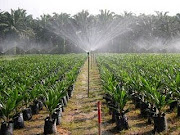NCIA, Hannan to set up aquaculture farm in Kerian
THE Northern Corridor Implementation Authority (NCIA) and Hannan Corp Sdn Bhd will set up a RM150 million aquaculture complex in Selinsing in Kerian district, Perak, which will have a capacity to produce some 14,400 tonnes of seafood per year.
The project involves a 760 site, which would have a feedmill, lab and processing factory. The project would take off in six months and the first production is expected next year. It would be implemented based on a contract-farming system, where locals, including graduates and fishermen, would be trained as aquapreneurs and the Japanese partner, Misaki Suisan Co Ltd, would buy back the produce.
"The project is not solely for profit but an effort by the state government to eradicate poverty and also provide employment and upgrade the social economic status of the residents," Perak Menteri Besar Datuk Seri Dr Zambry Abd Kadir said. He was speaking to reporters after witnessing the signing ceremony of the memorandum of understanding between NCIA and Hannan Corp in Ipoh yesterday.
NCIA was represented by its chief executive Datuk Redza Rafiq, while director Amir Ihsan Abd Salam signed on behalf of Hannan Corp. Misaki had entered an agreement with Hannan Corp to assist in training programmes in aquaculture as well as in purchasing the prawns. Each aquapreneur would be allocated five ponds and each pond is expected to produce 10 tonnes of seafood with three production cycles a year.
The project would also provide employment to 1,000 people as technicians, workers in hatchery, processing factory and related jobs. The prawns would be for local consumption and export. Zambry said the state government is in the final stage of drawing up guidelines and policies for the prawn industry so that it would not cause any negative impact on the environment. Manjung, Hilir Perak, Larut, Matang and Selama are the main districts which have a large number of prawn breeders.
Read more:
http://www.btimes.com.my/Current_News/BTIMES/articles/prawn/Article/#ixzz0oKR1lhs6
http://thestar.com.my/metro/story.asp?file=/2010/3/31/north/5958256&sec=north
http://www.bharian.com.my/bharian/articles/Utara_Ternakudangkomersial/Article
SIGNING OF MEMORANDUM OF UNDERSTANDING BETWEEN NCIA AND HSBC FOR THE DEVELOPMENT OF SELINSING AQUACULTURE COMPLEX ~ 6 April 2010
29 March 2010, Ipoh, Perak – The Northern Corridor Implementation Authority (NCIA) today signed a Memorandum of Understanding with Hannan Corporation Sdn. Bhd. (HCSB) for a collaboration in developing the Selinsing Aquaculture Complex in a joint effort to continue implementing sustainable agriculture programmes. The programme’s main objective is to augment poverty eradication efforts by providing employment opportunities through the contract farming amongst the participants. At the ceremony, NCIA was represented by its Chief Executive Dato’ Redza Rafiq whilst HCSB was represented by its Director Tuan Haji Ir. Amir Ihsan Abd Salam. The signing ceremony was made more eventful with the presence of The Right Honourable Dato’ Seri Dr. Zambry Abdul Kadir, the Chief Minister of Perak who witnessed the ceremony together with community leaders and members of the media.
Read more >>
http://www.ncer.com.my/?q=media_centre/news_article&nid=985
http://www.ncer.com.my/?q=media_centre/events_article&nid=983




